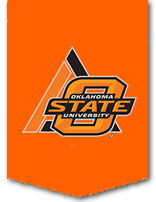FAPC seminar focuses on food allergen issues
By Mandy Gross
FAPC Communications Services Manager
(Stillwater, Okla. – July 6, 2009) Studies show between 6 and 7 million Americans suffer from food allergies. Because of the presence of food allergens, the Robert M. Kerr Food & Agricultural Products Center, located on the Oklahoma State University campus, held a seminar for its faculty, staff and students to learn more about the latest food allergen issues.
The FAPC invited Dr. Stephen Taylor, director of the Food Allergy Research & Resource Program and professor with the department of food science and technology at the University of Nebraska-Lincoln, to speak during the seminar and discuss allergens in relation to food processing and product development. Accompanying Taylor was Dr. Joe Baumert, assistant professor in FARRP and University of Nebraska-Lincoln’s department of food science and technology.
“Allergen management issues in big processing companies are a major problem,” Taylor said. “Allergens make a big difference in product development; it didn’t use to, but it does today.”
Allergens are proteins found in common food ingredients. Allergic reactions to food occur when the body’s immune system mistakenly attacks harmless food proteins. Although an individual could be allergic to any food, there are eight foods, known as the Big Eight, that account for 90 percent of all food-allergic reactions: eggs, fish, shellfish, milk, peanuts, soy, tree nuts and wheat.
Taylor said the major challenge with allergens in the food processing industry is sharing pieces of equipment to process different products. Generally, the equipment is hard to clean, and substances from one product that contains allergens could be transferred to another product when using the same equipment.
That is why many products’ packaging includes a statement that the products may contain allergens, even if the products do not include allergens in the ingredients list.
“Some companies are reluctant to add nuts to their products for fear they will come in contact with their equipment,” Taylor said.
A study conducted by FARRP tested cookies sold in grocery stores for the presence of allergens. Only 7 percent of the cookies tested actually contained peanuts, but 50 percent of the packages said the products may contain peanuts.
One of FARRP’s primary missions is to develop and provide the food industry with credible information, expert opinions, tools and services relating to allergenic foods.
FARRP was established in 1995 as a cooperative venture between the University of Nebraska and seven founding industry charter members. Today, FARRP has more than 50 member companies, more than 12 staff members and several graduate students.
Taylor’s research interests involve food allergies and allergy-like diseases; the development of immunochemical methods for the detection of allergens, proteins and toxins; the assessment of the allergenicity of food ingredients derived from commonly allergenic foods; and the effect of food processing on food allergens.
Dr. Roy Escoubas, FAPC director and professor, said he was delighted to have Taylor and Baumert visit the center and speak to the FAPC faculty, staff and students.
“Dr. Taylor was the director of the University of Nebraska-Lincoln Food Processing Center and head of the department of food science and technology when the FAPC was in its formative stages,” Escoubas said. “He was an important information source for the founding fathers of the FAPC.”
Oklahoma State University is a modern land-grant system that cuts across disciplines to better prepare students for a new world. Oklahoma’s only university with a statewide presence, OSU improves the lives of people in Oklahoma, the nation, and the world through integrated, high-quality teaching, research and outreach. OSU has more than 32,000 students across its five-campus system and more than 19,000 on its Stillwater campus; with students from all 50 states and about 110 nations. Established in 1890, OSU has graduated more than 200,000 students who have made a lasting impact on Oklahoma and the world. CREATE - INNOVATE - EDUCATE - GO STATE!
Go back to news release main page

